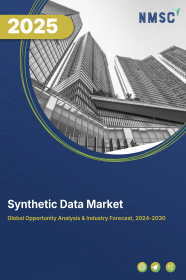
Synthetic Data Market by Data Type (Tabular, Text, Image & Video), Modeling Type (Direct, Agent-Based), Offering (Fully Synthetic, Partially Synthetic, Hybrid), Application (Data Protection, Sharing, Predictive Analysis, NLP, Others), and End-User (BFSI, Healthcare & Life Sciences, Transportation & Logistics, IT & Telecom, Retail & E-Commerce, Manufacturing, Consumer Electronics, Others) – Global Opportunity Analysis and Industry Forecast, 2024–2030
US Tariff Impact on Synthetic Data Market
Trump Tariffs Are Reshaping Global Business
Synthetic Data Market Overview
The global Synthetic Data Market size was valued at USD 0.28 billion in 2023 and is predicted to reach USD 2.63 billion by 2030 with a CAGR of 38.2% from 2024-2030.
The synthetic data market, also known as artificial data market refers to the creation of artificial data that emulates the characteristics of real-world data without involving actual personal or event-based information. This data is generated using sophisticated algorithms and simulation techniques, offering significant advantages such as enhanced privacy protection, cost efficiency, and rapid access to large datasets.
Artificial data also enables the generation of balanced data sets, reducing biases and facilitating more accurate testing and training of machine learning models. As organizations increasingly seek solutions to overcome privacy and data acquisition challenges, the market is poised for continued growth, becoming a crucial component in the advancement of artificial intelligence and data-driven innovations.
Market Dynamics and Trends
The global shift towards digitalization across the globe is driving the synthetic data market growth as organizations embrace digital transformation and seek diverse data solutions to advance artificial intelligence (AI), machine language (ML) and other emerging technologies. As digitalization increases the volume and complexity of data, artificial data offers a crucial means to manage, simulate, and utilize this information effectively.
According to the latest report published by International Data Corporation (IDC) the spending for digital transformation is expected to reach USD 3.9 trillion by 2027 globally, growing at a five-year CAGR of 16.1%. The surge in investment towards digitalization, drives the demand for advanced data solution including artificial data that in turn boosts the growth of the synthetic data market demand.
Moreover, the rapidly expanding healthcare sector, coupled with the rising demand for data security and privacy, is significantly driving the growth of the market. As healthcare organizations increasingly adopt digital technologies and collect vast amounts of sensitive data, artificial data provides a valuable solution by simulating real-world data while protecting personal information.
As per the report published by the Ministry of Health and Welfare, the total budget for healthcare in India was around USD 10.69 billion in 2023. Furthermore, as per the Government of Australia, the total budget on healthcare sector in 2022 was around USD 71.9 billion. The significant investments in healthcare, combined with the demand for data security and privacy fuels the growth of the market.
Furthermore, the rising adoption of AI and machine learning (ML) technologies in the finance sector is boosting the growth of the synthetic data industry. As financial institutions seek extensive, high-quality data for applications such as fraud detection and risk assessment, artificial data offers a solution by providing simulated datasets that protect privacy and support effective model training.
For instance, in June 2024, NVIDIA Corporation launched Nemotron-4, a suite of large language models (LLMs) designed to generate high-quality synthetic data for training robust AI systems across finance manufacturing and various industries. This development highlights the increasing significance of artificial data in supporting AI-driven innovation, further contributing to the synthetic data market expansion.
However, limited real-world variability and difficulty in validating the accuracy of data generated by the synthetic data are the major factors restraining the growth of the market. On the contrary, the introduction of latest technologies including synthetic open-source text-to-SQL is expected to create ample opportunities in the growth of the market. This dataset is designed to enhance AI capabilities by allowing businesses to generate and query databases using natural language.
Market Segmentations and Scope of the Study
The synthetic data market report is segmented on the basis of component, deployment mode, data type, application, end-user, and region. On the basis of component, the market is divided into solution and services. Based on deployment mode, the market is divided into on-premise and cloud.
On the basis of data type, the market is classified into tabular data, text data, image & video data, and others. On the basis of applications, the market is divided into AI training & development, test data management, data sharing & retention, data analytics, and others. Based on the end-user, the market is divided into BFSI, healthcare & life sciences, transportation & logistics, government & defense, IT & telecommunication, manufacturing, media & entertainment, and others. Regional breakdown and analysis of each of the aforesaid segments include regions comprising of North America, Europe, Asia-Pacific, and RoW.
Geographical Analysis
North America dominates the synthetic data market share and is expected to continue its dominance during the forecast period. This is attributed to factors such as growing healthcare and life science sector in this region, that is driving the demand for diverse privacy-preserving data for advancements in drug discovery, clinical trials, and personalized medicine.
According to a report from the Centers for Medicare & Medicaid Services (CMS), the medical spendings in the U.S is growing in a significant rate. The national health expenditure rose to around USD 4.84 trillion in 2023 from USD 4.50 trillion in 2022, emphasizing the demand for innovative data solutions, driving the growth of synthetic data market trends.
Moreover, the media & entertainment sector in this region is driving the growth of the market as it leverages synthetic data to enhance content creation, audience analytics, virtual production, and immersive experiences such as VR and AR applications.
According to the International Trade Administration, the U.S. Media and Entertainment (M&E) industry is the largest in the world at USD 660 billion in 2020.
On the other hand, Asia-Pacific is expected to show a steady growth in the synthetic data sector. This is attributed to the rising investment by the government of various countries towards digital transformation in this region. The Ministry of Commerce, set forward a comprehensive action plan to drive the digital transformation of its commercial sectors by 2026 in China. This action plan highlights innovation, international cooperation, and initiatives to boost consumer spending in digital, green, and health-related sectors. The surge in digitalization while maintaining the sustainability standards drives the demand for artificial data, thereby fuelling the growth of the market.
Moreover, the growing fintech industry is driving the expansion of the market as financial technology companies require extensive, high-quality data for applications such as fraud detection and credit scoring. Synthetic data provide secure, simulated datasets that support accurate model development and compliance.
According to Invest India, the fintech industry was valued at USD 584 billion in 2022 and is estimated to reach USD 1.5 trillion by 2025. The surge in fintech industry drives the demand for artificial data for various application thereby driving the market growth.
Competitive Landscape
Various market players operating in the synthetic data industry include Mostly AI, Microsoft Corportaion, Nvidia Corportaion, Amazon Web Services, Inc., CVEDIA Inc, Synthesis AI., IBM Corportaion, Gretel Labs., Hazy Limited, Syntheticus, Automaton AI, TagX, Edgecase.AI, Bitext Innovations Inc., Sky Engine, and others. These market players are adopting various strategies such as acquisition, partnership, and collaboration to remain dominant in the market.
For instance, in July 2024, NVIDEA Corporation launched generative AI models that enhance the capabilities for creating synthetic data, that is important in various industrial applications. These developments enable the generation of highly accurate virtual environments and digital twins, thereby driving innovation in sectors such as robotics and industrial design, and positioning NVIDIA to play a pivotal role in the expanding the market.
For instance, in May 2023, Databricks acquired Okera, a data governance platform with a focus on AI. The acquisition allowed Databricks to expose additional APIs that its own partners could use to provide solutions to their customers. Moreover, in January 2023, Microsoft entered into the partnership was aimed toward accelerating the advancement of AI technology and accessibility to all. The collaboration aims to ensure that AI technologies are safe, trustworthy, and beneficial to a broad audience, while also allowing each company to independently commercialize the resulting advanced AI technologies.
Furthermore, in December 2022, Amazon collaborated with Stability AI to enable the availability of open-source tools and models. Stability AI chose AWS as its preferred cloud provider for the development and expansion of AI models encompassing image, language, audio, video, and 3D content generation.
Key Benefits
-
The market report provides the quantitative analysis of the current market and estimations from 2024 to 2030. This analysis assists in identifying the prevailing market opportunities to capitalize on.
-
The study comprises of a detailed analysis of the current and future synthetic data market trends for depicting the prevalent investment pockets in the market.
-
The information related to key drivers, restraints, and opportunities and their impact on the market is provided in the report.
-
The competitive analysis of the market players along with their market share in the market is mentioned.
-
The SWOT analysis and Porter’s Five Forces model are elaborated in the study.
-
The value chain analysis in the market study provides a clear picture of the stakeholders’ roles.
Synthetic Data Market Key Segments
By Data Types
-
Tabular Data
-
Text Data
-
Image and Video Data
By Modeling type
-
Direct Modeling
-
Agent-BAsed Modeling
By Offering
-
Fully Synthetic Data
-
Partially Synthetic Data
-
Hybrid Synthetic data
By Application
-
Data Protection
-
Data Sharing
-
Predictive Analysis
-
Natural Language Processing (NLP)
-
Others
By End User
-
Banking, Financial Services, and Insurance (BFSI)
-
Healthcare and Life Sciences
-
Transportation & Logistics
-
IT & Telecommunication
-
Retail and E-Commerce
-
Manufacturing
-
Consumer Electronics
-
Others
By Region
-
North America
-
The U.S.
-
Canada
-
Mexico
-
-
Europe
-
The UK
-
Germany
-
France
-
Italy
-
Spain
-
Denmark
-
Netherlands
-
Finland
-
Sweden
-
Norway
-
Russia
-
Rest of Europe
-
-
Asia Pacific
-
China
-
Japan
-
India
-
South Korea
-
Australia
-
Indonesia
-
Singapore
-
Taiwan
-
Thailand
-
Rest of Asia Pacific
-
-
RoW
-
Latin America
-
Middle East
-
Africa
-
Key Players
-
Mostly AI
-
Microsoft Corportaion
-
Nvidia Corportaion
-
Amazon Web Services, Inc.
-
CVEDIA Inc
-
Synthesis AI.
-
IBM Corportaion
-
Gretel Labs.
-
Hazy Limited
-
Syntheticus
-
Automaton AI
-
TagX
-
Edgecase.AI
-
Bitext Innovations Inc.
-
Sky Engine
REPORT SCOPE AND SEGMENTATION
|
Parameters |
Details |
|
Market Size in 2023 |
USD 0.28 billion |
|
Revenue Forecast in 2030 |
USD 2.63 billion |
|
Growth Rate |
CAGR of 38.2% from 2024 to 2030 |
|
Analysis Period |
2023–2030 |
|
Base Year Considered |
2023 |
|
Forecast Period |
2024–2030 |
|
Market Size Estimation |
Billion (USD) |
|
Growth Factors |
|
|
Countries Covered |
28 |
|
Companies Profiled |
15 |
|
Market Share |
Available for 15 companies |
|
Customization Scope |
Free customization (equivalent to up to 80 working hours of analysts) after purchase. Addition or alteration to country, regional, and segment scope. |
|
Pricing and Purchase Options |
Avail customized purchase options to meet your exact research needs. |

















 Speak to Our Analyst
Speak to Our Analyst




















